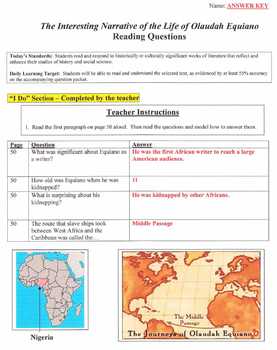
(Note: While historians have questioned his account, after reading their arguments and doing my own assessment of the documents, I am inclined to trust the veracity of Equiano’s story.) Unlike accounts of enslaved people that begin in the Western Hemisphere, Equiano introduces his readers to his homeland and people and focuses on the type of government established in his Igbo village, as well as his community’s marriage customs, arts, and agriculture.Īccording to Equiano, one of the Igbo community’s key beliefs was in a “Creator of all things” who “governs events, especially our deaths and captivity.” It was this Igbo predestinarian conviction among Igbos that likely made it easier for Equiano to accept the Christian doctrine of the Providence of God and is a major theme of the work. According to his Interesting Narrative, the author was born in what is now eastern Nigeria, in Igboland, in 1745. Much of what we know today about Equiano comes through his own words. I was sensible of the invisible hand of God, which guided and protected me, when in truth I knew it not: still the Lord pursued me. Now every leading providential circumstance that happened to me, from the day I was taken from my parents to that hour, was then, in my view, as if it had but just then occurred.


In his memoir, he drew connections between his traumatic life experiences and meeting God: Equiano’s narrative spurred nine English editions through 1794 and was published in Dutch, French, and Russian.ĭistinguishing itself from the arguments of abolitionists Thomas Clarkson and John Newton, Equiano’s Christian argument against the slave trade and slavery proved historically unique because he wrote about the horror of slavery, having experienced it firsthand. His Interesting Narrative served as the foremost abolitionist writing of the day because he was an African voice that described the violence and degradation of the slave trade and of slavery itself. His work was published under his birth name: The Interesting Narrative of the Life of Olaudah Equiano.Ī resident of London during the 1780s, Equiano became involved in British abolitionism and was a vocal opponent of the slave trade and slavery until his death in 1797.

This Christian was a previously enslaved man known as Gustavus Vassa, who, through writing his own life story, became the founder of a literary movement known as slave narratives. Christ was revealed to my soul as the chiefest among ten thousand,” wrote an 18th-century British seaman in 1789 as he reflected on his conversion that occurred five years previously. The word of God was sweet to my taste, yea sweeter than honey and the honeycomb.


 0 kommentar(er)
0 kommentar(er)
